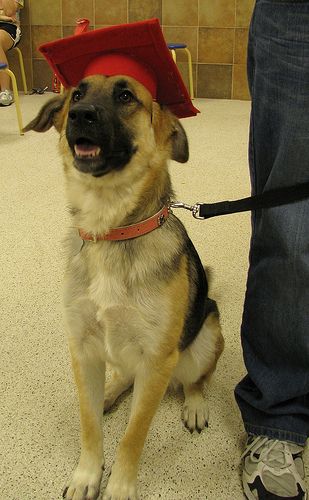Are you training your pet or is your pet training you? Just who is training who?
In most cases, it is the pet that has succeeded in training the humans in the household to do their bidding.
The humans might have initially wanted to train their pet but in the end, it is the animal that dictates what happens around the house.
Why? Because most people do not remain diligent and think exceptions to a rule are okay. I am here to tell you that they are not.
In fact, a variable reinforcement schedule is usually more powerful that a consistent one. (Another post in the future.)
Don’t think so? Let me give you an example.
The dog learns how to “shake” when his or her pet parent teaches the behavior. But soon, this behavior becomes a tool used to get the human’s attention and get what the animal wants–usually attention, petting, or a request for something like a food or toy.
The “shake” becomes a paw scraping the human’s leg or a door. The human responds to the animal’s activity with attention (and gratification) and so reinforces that new variation of the behavior and so it escalates.
Nudging or rubbing, pawing, vocalizations and scratching are all ways dogs and cats manipulate their owners because animals are great at reading human behavior and quickly learn how to get what they want by modifying human behavior.
Most pet parents oblige them and they do so without thinking about it, so they do it over and over again.
Now this is different from the topic I wrote about not too long ago (Are you fulfilling your pet’s needs or yours?) and it is a problem because it contributes to the creation of misbehavior.
I jokingly refer to felonious felines and delinquent dogs but the reality is that they learn how to manipulate to get what they want (or need) and when humans comply, that behavior is reinforced.
Of course, they also overtly take advantage of any situation if they are allowed to.
Part of this is an adaptation to survival.
Even though pets have been bred to be compliant and respond to leadership, they still have roots back to the wild animals.
This means they have a predisposition to taking advantage of any resources or opportunities that they can.
So both wild and domestic animals will engage in behaviors that will benefit them. They adapt to the environment quickly and adjust. If something works, it is likely to occur again. This comes from the adaptation for survival.
In essence, animals graduate quickly into new behaviors that suit them but that might not suit the household.
If this is a problem in your household, take some time to watch how you actually interact with your pet(s) and see if you are being trained by your pet or are training them.
You might find that you are training them to train you by accident!
So, do tell. In your home, is your pet training you, are you training your pet, or do you take turns?
Photo Credit: Jessica Whittle Photography



When my husband and I went to dog training classes with our first rescue sheltie the class was more about training the humans than the dogs. Once we understood our jobs, it was much easier to work on training the dogs.
Hey Bailey, that is exactly right. The animal training is the easy part, it is the humans that are a pain! LoL